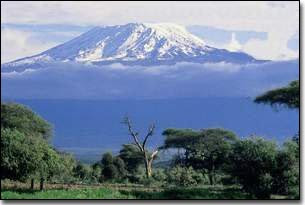Discover Serengeti It was 1913 and great stretches of Africa were still unknown to the white man when Stewart Edward White, an American hunter, set out from Nairobi. Pushing south, he recorded: "We walked for miles over burnt out country... Then I saw the green trees of the river, walked two miles more and found myself in paradise." He had found Serengeti. In the years since White's excursion under "the high noble arc of the cloudless African sky," Serengeti has come to symbolize paradise to many of us. The Maasai, who had grazed their cattle on the vast grassy plains for millennia had always thought so. To them it was Siringitu - "the place where the land moves on forever." | ||||||
The Serengeti region encompasses the Serengeti National Park itself, the Ngorongoro Conservation Area, Maswa Game Reserve, the Loliondo, Grumeti and Ikorongo Controlled Areas and the Maasai Mara National Reserve in Kenya. Over 90,000 tourists visit the Park each year. Two World Heritage Sites and two Biosphere Reserves have been established within the 30,000 km² region. It's unique ecosystem has inspired writers from Ernest Hemingway to Peter Mattheissen, filmakers like Hugo von Lawick and Alan Root as well as numerous photographers and scientists - many of which have put their works at our disposal to create this website. The Serengeti ecosystem is one of the oldest on earth. The essential features of climate, vegetation and fauna have barely changed in the past million years. Early man himself made an appearance in Olduvai Gorge about two million years ago. Some patterns of life, death, adaptation and migration are as old as the hills themselves. It is the migration for which Serengeti is perhaps most famous. Over a million wildebeest and about 200,000 zebras flow south from the northern hills to the southern plains for the short rains every October and November, and then swirl west and north after the long rains in April, May and June. So strong is the ancient instinct to move that no drought, gorge or crocodile infested river can hold them back. The Wildebeest travel through a variety of parks, reserves and protected areas and through a variety of habitat. Join us to explore the different forms of vegetation and landscapes of the Serengeti ecosystem and meet some of their most fascinating inhabitants. Welcome to the Serengeti. Magnificent Wildlife ".. The only living things which look as if they really belonged to it are the Wild Animals. Between the animals and Africa there is an understanding that the human beings have not yet earned .." Laurens van der Post, Venture to the Interior, 1963 Today, the Serengeti National Park, the Ngorongoro Conservation Area, and the Maasai Mara Game Reserve across the border in Kenya, protect the greatest and most varied collection of terrestrial wildlife on earth, and one of the last great migratory systems still intact. The Serengeti is the jewel in the crown of Tanzania's protected areas, which altogether make up some 14% of the country's land area, a conservation record that few other countries can match. Safari
Human Footprints The human history of the Serengeti is largely the history of the African people, from the hunter-gatherers of the distant past who roamed the vast plains, to those today who preserve it as a prime destination for visitors. Apart from Olduvai Gorge, which is formally part of the Ngorongoro Crater Conservation Area but an extension of the Serengeti and part of its ecosystem, the area's history has been virtually ignored. Tsetse flies in the woodlands, and with them sleeping sickness, ensured that the Serengeti was spared the type of European encroachment, and with it the decimation of the wildlife that other African countries were subjected to. The Leakeys' famous excavations at Olduvai Gorge show that our forebears lived and hunted in the area for some two million years before the German and then the British colonisers arrived. Man has always been part of the Serengeti and many people, tribes and remarkable individuals have left their footprints on its endless plains. | ||||||
Sunday, September 23, 2007
Weekend's Special: Serengeti National Park, Tanzania
Provided by
Ilhami
at
9/23/2007
![]()
Subscribe to:
Post Comments (Atom)








No comments:
Post a Comment